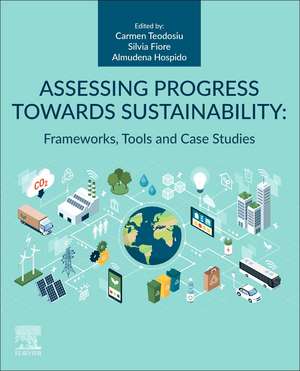Assessing Progress Towards Sustainability: Frameworks, Tools and Case Studies
Editat de Carmen Teodosiu, Silvia Fiore, Almudena Hospidoen Limba Engleză Paperback – 21 apr 2022
Combining methods and their application, the book covers a variety of topics, including lifecycle assessment, risk assessment, nexus thinking, and connection to SDGs. Organized clearly into three main sections --Frameworks, Tools, and Case Studies--this book can serve as a practical resource for researchers and practitioners alike in environmental science, sustainability, environmental management and environmental engineering.
- Offers an integrated approach to sustainability assessment using the most up-to-date frameworks and tools
- Includes extensive, diverse case studies to illustrate the methods and process for using the frameworks and tools outlined
- Provides practical insights related to challenges and opportunities to reduce environmental impacts and increase resources and energy efficiency
Preț: 722.33 lei
Preț vechi: 941.88 lei
-23% Nou
Puncte Express: 1083
Preț estimativ în valută:
138.23€ • 145.35$ • 114.21£
138.23€ • 145.35$ • 114.21£
Carte tipărită la comandă
Livrare economică 09-23 aprilie
Preluare comenzi: 021 569.72.76
Specificații
ISBN-13: 9780323858519
ISBN-10: 0323858511
Pagini: 470
Ilustrații: 75 illustrations (40 in full color)
Dimensiuni: 191 x 235 mm
Greutate: 0.8 kg
Editura: ELSEVIER SCIENCE
ISBN-10: 0323858511
Pagini: 470
Ilustrații: 75 illustrations (40 in full color)
Dimensiuni: 191 x 235 mm
Greutate: 0.8 kg
Editura: ELSEVIER SCIENCE
Cuprins
1. An integrated approach to assess the sustainability progress
SECTION 1. Frameworks for assessing sustainability
2. Sustainable development and its goals
3. Sustainability and the circular economy
4. The Food-Energy-Water Nexus Approach
5. The European Green Deal in the Global Sustainability Context
SECTION 2. Assessment tools for sustainability- methodological issues
6. Life Cycle Sustainability Assessment-based Tools
7. Footprint Tools
8. The combined use of Life Cycle Assessment and Data Envelopment Analysis to analyze the environmental efficiency of multi-unit systems
9. Territorial LCA
10. Environmental Impact and Risk Assessment
11. Multi-Criteria Decision Making
SECTION 3. Case studies for sustainability assessments
12. Life cycle assessment for eco-design in product development
13. Life Cycle Assessment for the design of a pilot Recovery Plant in the European context
14. LCA and food and personal care products sustainability: Case studies of Thai Riceberry rice products
15. Environmental and economic sustainability of cocoa production in West Sub-Saharan Africa
16. LCA/Sustainability assessment for urban water systems
17. Environmental sustainability in energy production systems
18. Sustainability assessment of biotechnological processes: LCA and LCC of second-generation biobutanol production
19. Footprint assessment of municipal solid waste management systems
20. How can we validate the environmental profile of bioplastics? Towards the introduction of Polyhydroxyalkanoates (PHA) in the value-chains.
21. Conclusions
SECTION 1. Frameworks for assessing sustainability
2. Sustainable development and its goals
3. Sustainability and the circular economy
4. The Food-Energy-Water Nexus Approach
5. The European Green Deal in the Global Sustainability Context
SECTION 2. Assessment tools for sustainability- methodological issues
6. Life Cycle Sustainability Assessment-based Tools
7. Footprint Tools
8. The combined use of Life Cycle Assessment and Data Envelopment Analysis to analyze the environmental efficiency of multi-unit systems
9. Territorial LCA
10. Environmental Impact and Risk Assessment
11. Multi-Criteria Decision Making
SECTION 3. Case studies for sustainability assessments
12. Life cycle assessment for eco-design in product development
13. Life Cycle Assessment for the design of a pilot Recovery Plant in the European context
14. LCA and food and personal care products sustainability: Case studies of Thai Riceberry rice products
15. Environmental and economic sustainability of cocoa production in West Sub-Saharan Africa
16. LCA/Sustainability assessment for urban water systems
17. Environmental sustainability in energy production systems
18. Sustainability assessment of biotechnological processes: LCA and LCC of second-generation biobutanol production
19. Footprint assessment of municipal solid waste management systems
20. How can we validate the environmental profile of bioplastics? Towards the introduction of Polyhydroxyalkanoates (PHA) in the value-chains.
21. Conclusions
